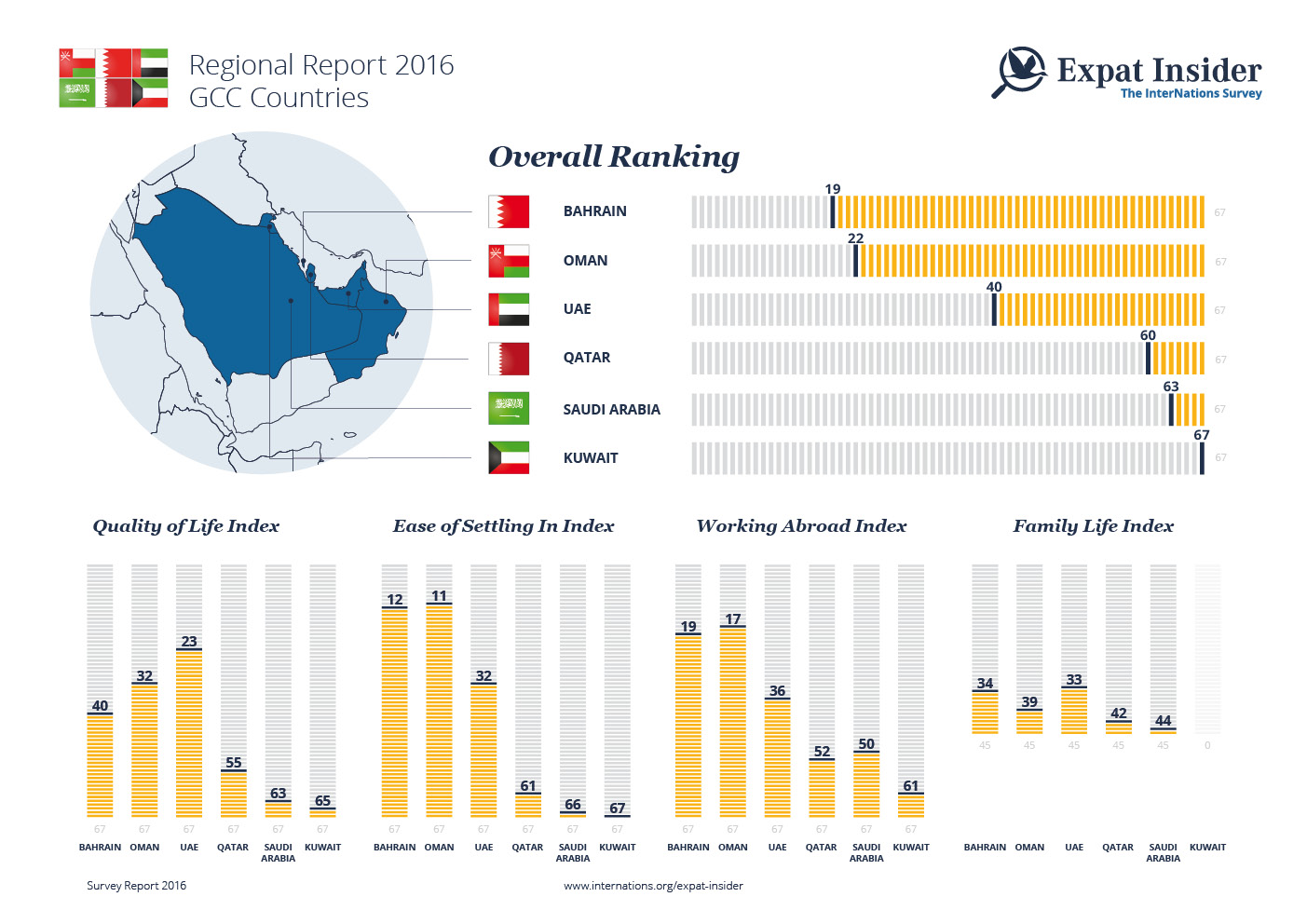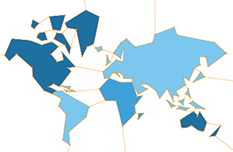GCC States: Dynamic Economies with Downsides
- Expats not impressed with quality of life in Gulf region
- Oman stands out for friendliness of local population
- Jobs draw expats to the region, but career prospects often disappoint
- Availability and cost of childcare present challenge to expat parents
Few Leisure Options, Political Instability, and a Skewed Gender Ratio
The GCC states’ rankings in the Quality of Life Index are, for the most part, among the worst in the world: Qatar, Saudi Arabia, and Kuwait rank 55th, 63rd, and 65th out of 67 countries, with the UAE and Oman standing out on place 23 and 32, respectively.
Firstly, expats are generally dissatisfied with leisure activities available in the region: only the UAE does better than the worldwide average, with 38% of expats expressing complete satisfaction with local leisure options. In comparison, only 5% of respondents in Saudi Arabia say the same.
Political instability in the Middle East is a major problem at the moment, and the Gulf States are also affected by it, according to the survey respondents. In fact, fewer expats in Bahrain, Kuwait, and Saudi Arabia are satisfied with the political stability in their country of residence than the global average of 61%. On the other hand, Oman and the UAE perform a lot better than the worldwide average: 85% and 81%, respectively, are generally happy with this factor.
However, this instability does not lead to issues with personal safety, with the region having a fairly low number of crimes. Most of the expats living in the region agree with this: for example, 63% feel very safe in the UAE, compared to a global average of 38%. Only Kuwait (27%) and Saudi Arabia (28%) perform worse than average in this regard.
Not surprisingly perhaps, the region is less attractive to expat women than to men. For example, there are only 15% of female expats in Saudi Arabia, and 33% in Qatar, compared to the global average of 49%. Three of the GCC states (Qatar, Kuwait, and Saudi Arabia) are also among the ten worst-rated destinations for expat women.
A Hot Climate, but No Warm Welcome
The results among the various destinations in the Ease of Settling Index vary greatly: Oman and Bahrain feature in the global top 15 while Qatar, Saudi Arabia, and Kuwait rank 61st, 66th, and 67th out of 67, respectively.
Unsurprisingly, the responses to individual questions cover a wide range of reactions, ranging from a mere 35% of expats saying the locals are friendly in Kuwait, to an overwhelming 87% positive ratings in Oman. Qatar and Saudi Arabia are also below the worldwide average of 69%, with a respective 47% and 38% of positive respondents.
Furthermore, 21% of expats in Oman and Bahrain say that making local friends is very easy, compared to the worldwide average of 12%. However, all the other Gulf States have below-average ratings for this question, and it seems that the language might also be a contributing factor.
In fact, the survey respondents across every country of the region find learning the local language less than easy: for example, only 5% of expats in Qatar consider it very easy to learn, compared to 11% globally.
However, most expats in the region (between 56% and 74%) agree that it is not necessary to speak Gulf Arabic in order to get by in everyday life, especially in Bahrain, Oman, and the UAE, where Arabic and English are the main business languages. The only exception to this rule is Saudi Arabia, where only 43% of the respondents think it’s easy to get by without speaking the language, exactly the same proportion as the global average.
Job Market and Financial Reasons as “Pull Factors”
In the Working Abroad Index, the best-ranking Gulf countries are again Oman and Bahrain, both featuring among the top 20 worldwide. The UAE comes in just above the global average, on 36th place, while the rest (Kuwait, Qatar, and Saudi Arabia) are all in the bottom 20.
An interesting fact about the region is that Indian expats constitute the largest nationality in terms of numbers, except for Saudi Arabia, where Pakistani expats are the most numerous. The most likely explanation would be the availability of jobs, often with higher wages than in their home countries, coupled with the relative proximity of the Gulf region to South Asia.
In fact, expats in the region say their top three reasons for relocation are all financial or work related, with the exception of the UAE, where an improved quality of life was another deciding factor. However, respondents are not particularly satisfied with the career prospects offered in the region; only the UAE and Bahrain outperform the worldwide average of 55% positive ratings, with 62% and 57%, respectively.
Furthermore, the work-life balance (or lack thereof) seems to be a problem: in most of the Gulf States, expats work on average more than 45.2 hours a week, except for those in Oman, where the average work week is 43.3 hours, still more than the global average of 41.4 hours.
Moreover, in the UAE, Kuwait, and Qatar, more than 50% of expats also state that they are dissatisfied with the cost of living, compared to less than a third worldwide (32%). This surge in the cost of living can be attributed to the region’s impressive economic growth in the last three decades. The notable exception here is Saudi Arabia, where only 16% of expats are less than happy with the cost of living. In that specific case, government subsidies may help to keep living expenses affordable.
A Less Than Family-Friendly Place
In the Family Life Index, all Gulf States rank in the bottom 15 out of 45 destinations, with the UAE coming in at 33rd and Saudi Arabia at 44th. Also, please note that Kuwait is not featured in the ranking since the number of respondents with families was too few to be statistically significant.
When it comes to the available childcare options, only Bahrain (48%) and the UAE (51%) outperform the global average of 46% positive ratings. Oman, however, has the lowest percentage in the region, with only 23% of expats saying they are satisfied with the availability of childcare.
Furthermore, childcare options seem to be both too few and too expensive: nearly a quarter of the expats in Qatar (24%) think that childcare is very difficult to afford. The UAE (17%) and Saudi Arabia (15%) also do worse than the worldwide average of 11% for those who are completely dissatisfied with the cost of childcare; however, only 3% of expats in Bahrain say that childcare is very expensive.
Expats in the region are generally as satisfied as the global average among expat parents when it comes to the quality of education (64% positive ratings worldwide): Bahrain and Saudi Arabia stand out, though — the one in a positive way, the other less so. In fact, more than two-thirds of expat parents in Bahrain (69%) are generally satisfied with the quality of education, while only 38% say the same about Saudi Arabia.
Even though the quality seems to be on par with the worldwide average, expat families say that there aren’t enough options for their children’s education across the region. Again, Saudi Arabia fares worst, with only 24% of parents agreeing that education options are numerous and easily available (globally: 49%).
Further Reading
- OSAC: United Arab Emirates 2016 Crime & Safety Report
- OSAC: Saudi Arabia 2016 Crime & Safety Report
- Emirates Group Career: Discover Dubai: People and Languages
- Gulf News: Making Money from Rising Cost of Living in GCC
- Bloomberg: Saudi Prince Says Kingdom Working to Soften Subsidy Cut Blow [
- Living in Bahrain
- Living in Saudi Arabia
- Jobs and Business in the UAE
- Living in Qatar
- Living in Oman
- Moving to Kuwait




